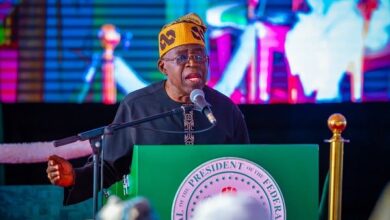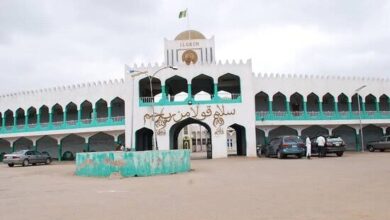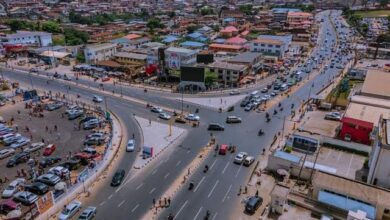Fact-Check: No Evidence to Support Claim That FG Has Announced Plans to Stop Importation of Solar Panels
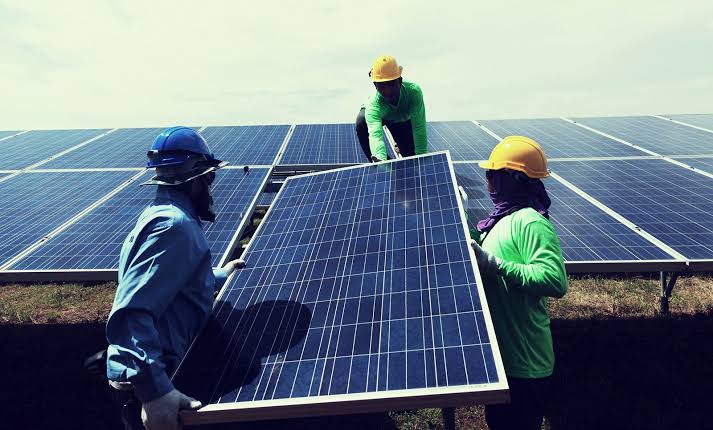
BY: Oluwaseye Ogunsanya
Claim
Multiple reports claimed that the Federal Government of Nigeria has announced plans to stop the importation of solar panels as part of efforts to boost local production and drive Nigeria’s clean energy transition.
Verdict
No evidence!
Full Text
Multiple reports here, here, here and here claimed that the Federal Government of Nigeria has announced plans to stop the importation of solar panels as part of efforts to boost local production and drive Nigeria’s clean energy transition.
The reports stated that the Minister of Science and Technology, Uche Nnaji made this disclosure in an interview during the unveiling of the NEV T6 electric buses in Abuja recently. He said the move aligns with Presidential Executive Order No. 5, which seeks to promote local content in science, engineering, and technology.
According to Nnaji, the country is already making significant investments in renewable energy infrastructure, adding that Nigeria has the capacity to meet its solar energy demands locally, with organisations like the National Agency for Science and Engineering Infrastructure (NASENI) playing a key role in solar panel production. He also projected that, with the expansion of local solar panel manufacturing, more Nigerian homes and institutions would transition to off-grid power solutions
He said: “We have lithium in abundance here in Nigeria, so Mr. President is already taking action. We are adding value to our raw materials. The lithium we have here will be processed and used as batteries for these vehicles.”
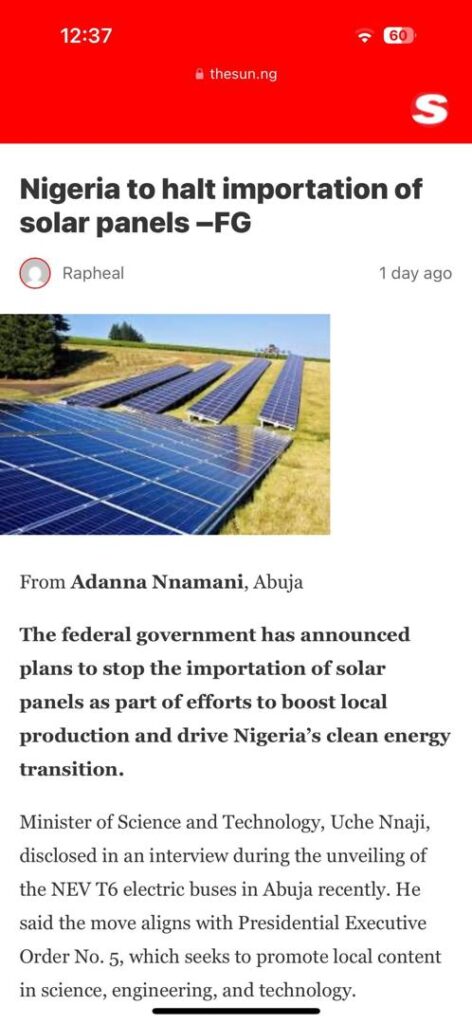
Photo Credit: Screenshot of the claim/The Sun
Verification
To ascertain the accuracy of this claim, FactCheckAfrica carefully looked through the internet and other news platforms to check for the video evidence of the minister’s interview. Our efforts proved futile as the video of the interview was unavailable and most news platforms only published the text version of it making the claim highly questionable.
Similarly, a check on the Minister’s official X page on the same news revealed a different account of the same event. According to the post published on 14th of March, 2025, titled NIGERIA UNVEILS NEV T6 ELECTRIC BUS & CHARGING INFRASTRUCTURE IN LANDMARK CLEAN ENERGY MOVE, Nnaji hailed the initiative as a game-changer for Nigeria’s transportation sector, aligning with President Bola Ahmed Tinubu’s Renewed Hope Agenda.
He also emphasized that the electric bus and its supporting infrastructure directly support key pillars of the Renewed Hope 8-Point Agenda, particularly in economic growth, job creation, energy transformation, and industrialization adding that the launch signals Nigeria’s commitment to reducing its carbon footprint, improving urban mobility, and embracing next-generation energy solutions.

Photo Credit: Screenshot of Nnaji’s Post on the Unveiling of NEV T6 Electric Bus & Charging Infrastructure
Conversely, the claim that the Federal Government has announced plans to stop the importation of solar panels was countered by the recent announcement that the Federal Ministry of Innovation, Science and Technology (FMIST) has signed a Solar Modular Master Supply Agreement for 2,600 Megawatts with Alternative Petroleum & Power Limited (APPL) and LONGi Solar France SARL, a subsidiary of LONGi Green Energy Technology Co., Ltd.

Photo Credit: Screenshot of Nnaji’s Post Announcing Nigeria’s Landmark 2,600MW Solar Deal with LONGi
This agreement according to a post made by the minister on his X page on Wednesday revealed that the agreement marks “one of the largest solar procurement deals in sub-Saharan African history.”
The post which outlined some of the benefits of the deal also stated that the solar modules will power Nigeria’s visionary Green Hydrogen Hub Project, strategically located in the Liberty Oil & Gas Free Trade Zone in Akwa Ibom State, aiming to “anchor Nigeria’s entry into the global green hydrogen value chain, leveraging the country’s vast solar resources and positioning it as a regional hub for clean energy production.”
“This bold move catapults Nigeria into the top tier of global solar energy players — a status that will have lasting implications for energy access, industrialization, and climate leadership on the continent. When operational, the hub will power green hydrogen production at industrial scale, fueling exports, local manufacturing, and clean mobility — particularly in marine and heavy transport sectors. Experts estimate the initiative could generate over 20,000 direct jobs, offering opportunities in engineering, logistics, R&D, manufacturing, and maintenance across Nigeria.” The post reads in part.
Conclusion
From the foregoing, it can be inferred that the claim that the Federal Government of Nigeria has announced plans to stop the importation of solar panels is inaccurate based on our findings.
While there was no video evidence to support the interview in which the minister made the claim, the announcement of Nigeria’s landmark 2,600MW solar deal with LONGi, the Chinese renewable giant, which will see the country relying on LONGi for the supply of solar modules or solar panels also renders the claim inaccurate.


